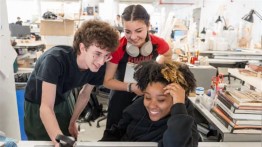School of Architecture Transfer Application Process

Students in the Architecture Studio
Dates and Deadlines
- Regular Decision
-
- Application Deadline: January 5
- Studio Test Live: Monday, January 12
- Studio Test Submission Deadline: Monday, February 9
(both physical and digital submissions are required) - Decision Notification: April 1
Application Instructions
To be eligible as a transfer applicant to The Irwin S. Chanin School of Architecture:
- You must have completed at least one year of an accredited architecture program by June of the year for which you are applying;
- OR by June hold a bachelor's degree or the equivalent in a discipline other than architecture;
- OR submit a portfolio of your creative work and you have begun studies in a discipline related to architecture.
- Application Steps
-
- A completed Cooper Application
- Two letters of recommendation
- Official high school transcript or GED certificate (include mid-year report if currently enrolled in school)
- Official college transcripts for ALL schools attended, sent directly from the college or university
- SAT/ACT (test optional)
- English language proficiency test (if applicable)
- $75 application fee or fee waiver (if applicable)
- Required Supplemental Materials: Studio Test + Portfolio
-
- The Studio Test is a required part of your application to The Cooper Union Irwin S. Chanin School of Architecture. This creative assessment is a cornerstone of our long-standing admissions process, designed to show the admissions committee your creative thinking, problem-solving abilities, and how effectively you can follow directions and manage your time.
- Each year, the Studio Test features a set of visual and written prompts. These are thoughtfully developed by our core faculty and in collaboration with students. You will have approximately one month to complete and submit the test. No prior experience in architecture is required.
- Detailed instructions will be available in your applicant portal within one week of the application deadline. You will also receive an email with clear guidance on how to complete and submit the Studio Test.
- Portfolio (to be submitted with the Studio Test)
- Your portfolio should consist of around 15-20 images of your strongest, most recent works
- International Student Requirements
Note: If admitted, transfer students are offered admission into a specific year of the five-year design sequence. Placement in the design sequence is a condition of the offer of admission and not subject to further review or appeal. By accepting the offer of admission, the transfer student agrees to this placement and acknowledges his/her anticipated graduation date.
Due to the small size of the programs, the deferral of an offer of admission to the Bachelor of Architecture program is not permitted.
If you have questions about our undergraduate application process, please attend an info session, check out our FAQs, or email us at admissions@cooper.edu..




